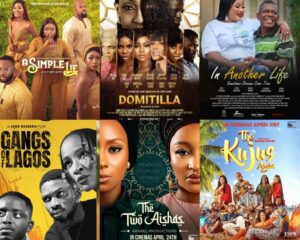The Evolution of Nollywood on Netflix, From Local Drama to Global Stage
From Street Corners to Streaming Screens
There was a time when Nollywood lived in the streets. Films came wrapped in nylon, stacked on wooden shelves in Alaba market, or sold from car boots at bus stops. Families gathered around box televisions, eating dinner while watching stories that were raw, chaotic, but undeniably ours. Nollywood was never perfect, but it was alive, loud, and impossible to ignore.
Fast forward to today, and the same industry that once thrived on VHS tapes now sits comfortably on Netflix, rubbing shoulders with Hollywood blockbusters and Korean dramas. Nollywood has evolved, not just into a Nigerian success story, but into a global cultural force.
Nollywood Before Netflix: The Home Video Revolution
To understand Nollywood’s Netflix journey, you must first respect its roots. Born in the early 90s with films like Living in Bondage, Nollywood thrived on speed and quantity. Stories of love, betrayal, family curses, and village drama were shot quickly and released even faster.
It was an industry built for Nigerians by Nigerians. You could buy a CD for less than the price of lunch, and everybody from your grandma in the village to your cousin in the city watched the same films. Nollywood became Africa’s mirror, even with shaky cameras and scripts written overnight.
But the same system that made Nollywood popular also held it back. Piracy swallowed profits, poor budgets killed innovation, and local films rarely crossed Nigerian borders. Nollywood was a giant, but it was locked inside its own house.
Netflix Enters the Scene
In 2015, whispers started. Netflix was looking at Africa, and Nollywood was impossible to ignore. By 2018, Genevieve Nnaji’s Lionheart became Netflix’s first Nigerian original, making history. Suddenly, Nollywood was no longer confined to Lagos living rooms, it was streaming in New York, London, and Tokyo.
The move shocked the industry. Some saw Netflix as a savior, others feared it would hijack Nigerian storytelling. But one thing was clear: Nollywood had finally found a passport to the global stage.

Storytelling Evolution: From Melodrama to Masterpieces
The Netflix era demanded more than speed, it demanded excellence. Nollywood filmmakers began to stretch beyond familiar tropes. The old days of endless love triangles and village witchcraft gave way to layered plots, bigger budgets, and world-class cinematography.
King of Boys: The Return of the King proved Nigerian political thrillers could rival anything from the West. Blood Sisters introduced gritty crime drama with a female-led cast that trended globally. Aníkúlápó transported viewers to a mystical Yoruba kingdom, blending tradition with fantasy.
Through Netflix, Nollywood evolved into something bigger not just entertainment for Nigerians, but stories powerful enough to move people across continents.
RELATED STORY:
-
Why Nollywood Rom Coms Are Taking Over Friday Nights
-
Old Nollywood,The Beautiful Chaos That Raised Us
-
5 Nollywood Dramas That Shaped Our Childhood With Horror
-
Netflix Stays in Nigeria: Nollywood’s Global Future Still Bright
The Global Reception: Nigeria on the World’s Lips
For the first time, Nigerians saw their languages, fashion, and culture trending in Netflix Top 10 lists worldwide. Diaspora communities proudly tweeted, “That’s my country on your screen!” International critics, who once dismissed Nollywood as low-budget drama, began calling it “the new wave of African cinema.”
It was emotional, almost spiritual, to hear Yoruba, Igbo, or Pidgin spoken on global platforms without apology. Nollywood wasn’t just telling stories, it was telling our stories, and the world was finally listening.
The Business of Nollywood on Netflix
Behind the glamour, Netflix’s arrival also changed the business. Suddenly, filmmakers had bigger budgets, better distribution, and international exposure. Jobs multiplied, crews expanded, and Nigerian technical talent got the chance to match Hollywood standards.
But not everyone was smiling. Critics argue that Netflix holds too much control, that deals are not always fair, and that some filmmakers are pressured to dilute stories for a “global” audience. The balance between global reach and local authenticity remains delicate.
Challenges: Authenticity vs Global Appeal
Nollywood’s Netflix journey is not without growing pains. Some worry that the hunger for international recognition might water down Nigerian storytelling. Will Nollywood forget the spice, humor, and raw energy that made it unique?
Others point to inconsistencies for every Blood Sisters; there’s a rushed film that disappoints audiences. The industry still battles the ghosts of its past: uneven scripts, weak dialogue, and overused tropes.
Yet, the evolution continues, and each misstep feels like part of a bigger story of growth.
The Future: Nollywood Beyond Borders
The next chapter promises even more. Imagine Nigerian sci-fi infused with Afrofuturism, animated folklore retelling our myths to global kids, or fashion-forward films setting global trends. Netflix is just the beginning. Nollywood has the potential to dominate not just Africa, but the world stage.
The industry’s heartbeat is stronger than ever, driven by young directors, bold storytellers, and audiences who refuse to be ignored. Nollywood no longer whispers in Alaba, it now roars across the world.
Conclusion: A Seat at the Global Table
Nollywood’s journey from local drama to Netflix glory is more than an industry story, it is cultural history. From shaky VHS tapes sold on Lagos streets to films trending worldwide, the message is clear, Nigerian stories matter, and the world is hungry for them.
From Alaba market to Netflix queues, Nollywood has proven one truth: stories born on our streets can live forever on the world’s stage.
ALSO READ:
-
Cinema Weekend Reloaded: 7 Nollywood Movies to Kick Back With This Weekend
-
Romoke’s Fire Returns in Ewa Aganyin 2-This Time, She’s Not Just Surviving, She’s Reclaiming

Desauce Magazine is more than a blog, it is a cultural journal capturing the rhythm of Nigeria. From music and film to lifestyle and social issues, we tell stories that reflect the energy, struggles, and brilliance of our people.



